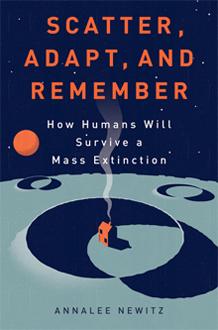Spoiler alert: Humans survive at the end of the world.
It’s a bit more complicated than that, of course, but it’s good to start on a note of hope. It’s a hope we can afford to have, as Annalee Newitz (editor of science and culture site io9.com, and a former Guardian contributor) discovered in the research that yielded her book Scatter, Adapt, and Remember: How Humans Will Survive a Mass Extinction (Doubleday, 320 pp., $26.95). She’s among the participants in tonight’s “Last Things”-themed InsideStoryTime at North Beach’s Glass Door Gallery.
Fascinated with the possibility of future disasters, Newitz set out to learn all there is to learn about the history of mass extinctions on Earth. From megavolcanoes to meteor strikes, the common thread of disaster on this planet is that something has always survived. An impressive amount of work is being done to make it possible for us to continue this streak of survival, and we all possess some tools of survival already.
Given my vague and largely unexplored interest in science and my undying obsession with Pacific Rim and the idea that humans could come together and build giant robots to fight giant monsters, Scatter was the book I didn’t know I needed until it was already in my hands. That’s not to say Newitz proposes that we focus our resources to build Jaegers in preparation of a kaiju apocalypse. But the message of world unity in the face of the threat of extinction that shines through in films like these shouldn’t be taken for granted. As Newitz writes, “We can only meet the challenges of surviving whatever the natural world throws at us by working together as a species in small and large ways.”
Perhaps you’re skeptical of humanity’s ability to get along on that great of a scale. I know I am. But in the face of something as dire as mass extinction, our instincts should kick in. As the title suggests, some of the strategies that may save us are to scatter – diaspora has resulted in the survival of groups of people over generations – adapt – to change our ways for a more sustainable future – and remember – passing on the knowledge that will advance us through the years. The latter is particularly important, because while we’re not all scientists, we’re all capable of telling our stories and doing our part.
But that’s not all we can do. Newitz proposes reshaping cities as we know them, and guess what city is said to be a great template for the “mutated metropolis”? That’s right, our very own City by the Bay. Historically considered a “wide-open city,” meaning that it’s a city “prepared to tolerate,” San Francisco is an ideal site for the types of change that could ultimately save us. So maybe we should be building a Jaeger, since San Francisco is the first city to be destroyed by a kaiju attack. Sorry, did I mention I really loved Pacific Rim?
But in all seriousness, the things we should be thinking about combating are climate change and pandemics. Newitz discusses the work we need to do to regulate the space around us and cool down the planet. And if you haven’t already dismissed anti-vaccination discussions, consider this: biomedical model expert Brian Coburn and his colleagues have found that “vaccinating 80% of children (less than 19 years old) would be almost as effective as vaccinating 80% of the entire population.” Meaning we should really consider how we can vaccinate globally.
But though we should be thinking about terraforming Earth to make it more sustainable, in the long run, we should be looking to the stars and considering terraforming other planets. Did anyone else first learn the word “terraforming” from Firefly? Because I sure did, and to think that Captain Malcolm Reynolds’ opening commentary on the show about the Earth getting used up and having to terraform other planets might actually be nonfiction one day is fascinating. And the space elevators that could make day trips off Earth possible are in the works!
Scatter, Adapt, and Remember is part cautionary tale, part how-to guide, and part super cool and nerdy science. Taken to heart, it’ll leave you more knowledgeable and hopeful for our continued existence, and possibly inspire more great minds to take action to ensure our survival.
InsideStoryTime: Last Things
With Annalee Newitz, Lucy Corin, Ransom Stephens, Guy Benjamin Brookshire, and Angelica Oung, with MC James Warner
Thu/21, 7-9pm, free
Glass Door Gallery
245 Columbus, SF

